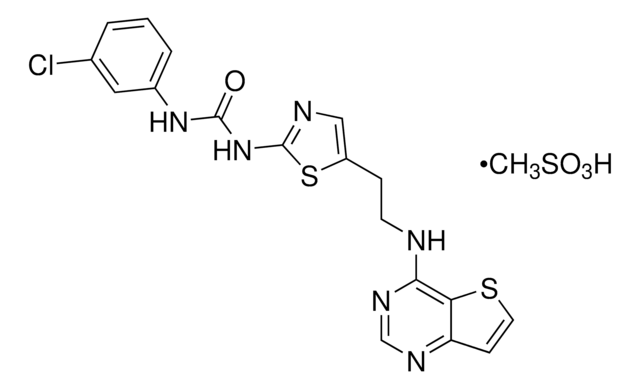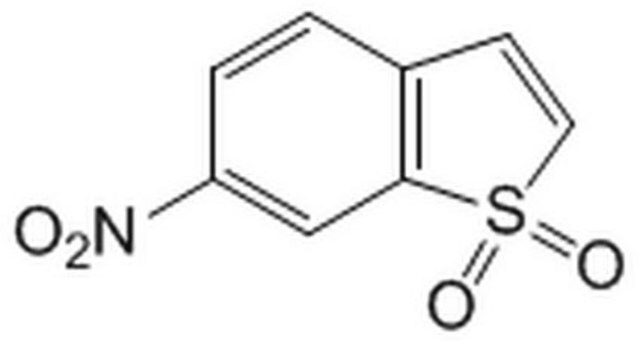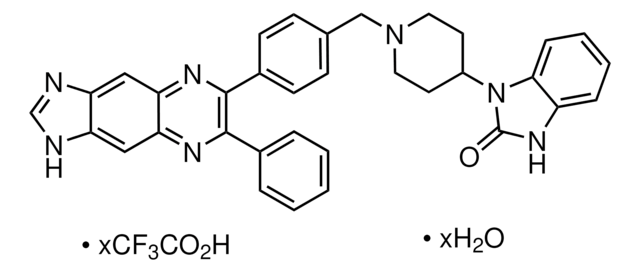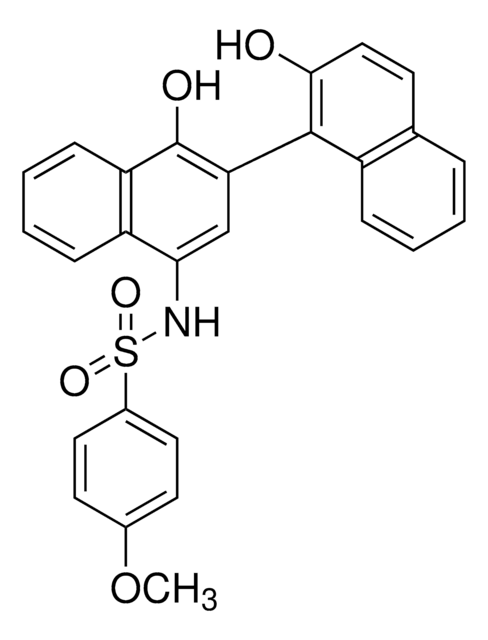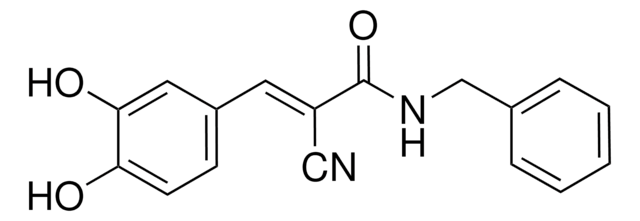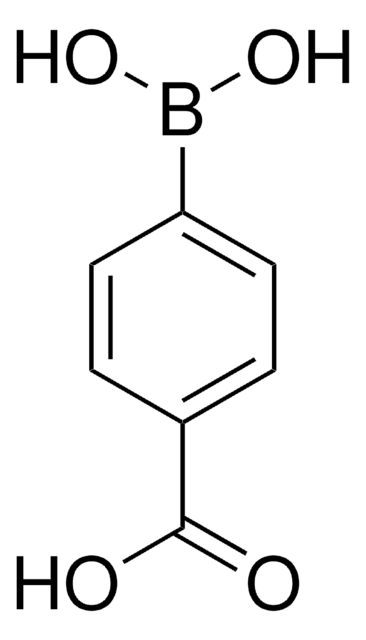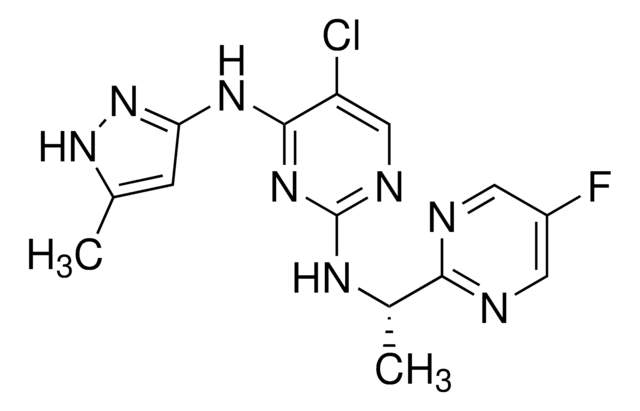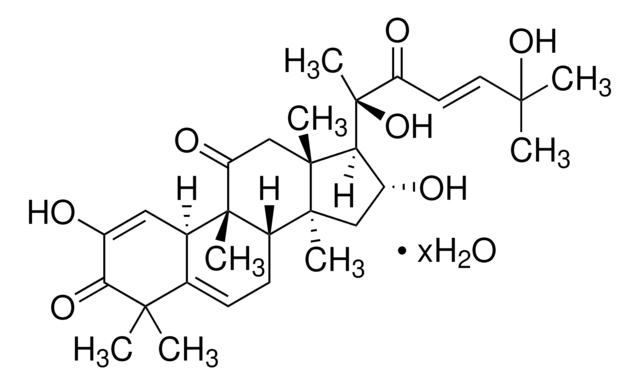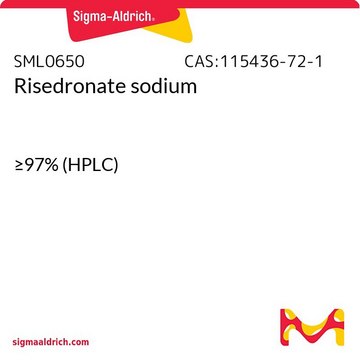SML0330
S3I-201
≥97% (HPLC)
Sinonimo/i:
2-Hydroxy-4-[[[[(4-methylphenyl)sulfonyl]oxy]acetyl]amino]-benzoic acid, NSC 74859
Autenticatiper visualizzare i prezzi riservati alla tua organizzazione & contrattuali
About This Item
Formula empirica (notazione di Hill):
C16H15NO7S
Numero CAS:
Peso molecolare:
365.36
Numero MDL:
Codice UNSPSC:
12352200
ID PubChem:
NACRES:
NA.77
Prodotti consigliati
Livello qualitativo
Saggio
≥97% (HPLC)
Stato
powder
Colore
white to beige
Solubilità
DMSO: >10 mg/mL
Temperatura di conservazione
−20°C
Stringa SMILE
Cc1ccc(cc1)S(=O)(=O)OCC(=O)Nc2ccc(C(O)=O)c(O)c2
InChI
1S/C16H15NO7S/c1-10-2-5-12(6-3-10)25(22,23)24-9-15(19)17-11-4-7-13(16(20)21)14(18)8-11/h2-8,18H,9H2,1H3,(H,17,19)(H,20,21)
HWNUSGNZBAISFM-UHFFFAOYSA-N
Applicazioni
S3I-201 has been used as a signal transducer and activator of transcription 3 (STAT3) inhibitor:
- to confirm the role of STAT3 phosphorylation in interleukin (IL)-33 production in lung epithelial cells and IL-22 mRNA expression in sorted group 3 innate lymphoid cells (ILC3s)
- to study the cellular response of STAT3 triggered by β-hexaclorocyclohexane (β-HCH) in various cell lines
- to examine the influence of STAT3 in response to angiotensin II (ang II) on induction of fibrotic proteins in kidney epithelial cells
Azioni biochim/fisiol
Inhibition of signal transducer and activator of transcription 3 (STAT3) activity by S3I-201 may be a potential therapeutic strategy for hypertensive kidney disease.
S3I-201 is a cell-permeable Stat3 inhibitor that binds to the Stat3-SH2 domain, prevents Stat3 phosphorylation/activation, dimerization, and DNA-binding.
Codice della classe di stoccaggio
11 - Combustible Solids
Classe di pericolosità dell'acqua (WGK)
WGK 3
Punto d’infiammabilità (°F)
Not applicable
Punto d’infiammabilità (°C)
Not applicable
Scegli una delle versioni più recenti:
Possiedi già questo prodotto?
I documenti relativi ai prodotti acquistati recentemente sono disponibili nell’Archivio dei documenti.
I clienti hanno visto anche
Gaurav Kumar et al.
Radiology, 286(2), 524-536 (2017-09-08)
Purpose To (a) identify key expressed genes in the periablational rim after radiofrequency ablation (RFA) and their role in driving the stimulation of distant tumor growth and (b) use adjuvant drug therapies to block key identified mediator(s) to suppress off-target
Safiye E Sarper et al.
Scientific reports, 8(1), 10906-10906 (2018-07-22)
Rodent incisors grow permanently and the homeostasis of enamel production is maintained by a continuous supply of epithelial progenitors from putative stem cells in the cervical loop. We herein report that Runx1 regulates the Lgr5-expressing epithelial stem cells and their
Sang-Hun Kim et al.
Molecular medicine reports, 16(6), 9224-9232 (2017-10-11)
Chlorogenic acid (CA) is a phenolic compound purified from coffee, fruits and their associated beverages, which possess various biological properties, such as antioxidant and anticarcinogenic activities. The present study evaluated the effects of CA on lipopolysaccharide (LPS)‑induced inflammation in RAW264.7
Wei-Jan Wang et al.
Clinical cancer research : an official journal of the American Association for Cancer Research, 23(2), 503-513 (2016-07-21)
Cisplatin (CDDP) is frequently used in combination chemotherapy with paclitaxel for treating urothelial carcinoma of the urinary bladder (UCUB). CDDP cross-resistance has been suggested to develop with paclitaxel, thus hindering successful UCUB treatment. Therefore, elucidating the mechanisms underlying CDDP-induced anticancer
Kwang Bo Jung et al.
Journal of clinical medicine, 8(7) (2019-07-07)
Human intestinal organoids (hIOs), which resemble the human intestine structurally and physiologically, have emerged as a new modality for the study of the molecular and cellular biology of the intestine in vitro. We recently developed an in vitro maturation technique
Il team dei nostri ricercatori vanta grande esperienza in tutte le aree della ricerca quali Life Science, scienza dei materiali, sintesi chimica, cromatografia, discipline analitiche, ecc..
Contatta l'Assistenza Tecnica.
